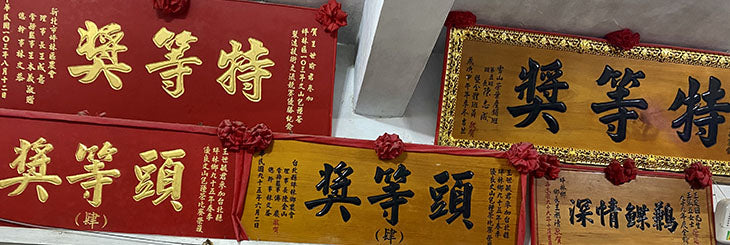
Pinglin Qin Xin Black Tea | Eco-Cha Tea Club

Batch #56 of the Eco-Cha Tea Club is a Black Tea made from the Qing Xin cultivar, grown in the Pinglin tea growing region in northern Taiwan. This Black Tea is made by the same artisan tea maker who made the top 5% award-winning Baozhong Tea we offered as Batch #55 of the Eco-Cha Tea Club. His spring and winter crops are made into Wenshan Baozhong tea, for which his family has a legacy, and his summer crops are made into high-grade Black Tea.

The photo above is of the living room wall of this farmer's home — crammed with top ranking awards, and a photo of his father with Taiwan's first elected president in the late 90's. This living heir of a lineage of tea masters is the most unassuming, down-to-earth tea maker we know. We've only really gotten to know him in the last couple of years, and our respect has only deepened.
We talked about Small Leaf Black Tea making with him over a year ago, and how it is widely available in central Taiwan, where Eco-Cha is based. At the end of the conversation, he offered us a sample to take home and suggested that we let a few of our tea farmer friends in central Taiwan do a comparison in order to understand why his Black Tea is significantly more expensive. Now, a year later, with this batch of tea we procured for the Eco-Cha Tea Club — we are convinced that his point was well made. It's quite possible that the sample he gave us last year was indeed from the same batch of tea we are sharing this month!

Above is the batch of Qing Xin Black Tea being shared this month with the Tea Club. It was made in summer 2019 and aged for one year. High-grade Black Tea reaches its peak of quality after "resting" for at least a year after being made. This batch, like our current in-store batch of Wenshan Baozhong Tea, is a combination of two consecutive days of harvest. Combining different days of the same harvest can offer a more well-rounded flavor profile. This batch of tea was destemmed and sorted by machine to produce only the highest grade leaf from this harvest.
The name Small Leaf Black Tea is to be distinguished from the strains of tea plants that are traditionally used for Black Tea making. Primarily, Black Tea is made from large leaf strains of tea, the most common of which is the Assam strain that was originally cultivated in India. Large leaf type cultivars are akin to the wild tea tree that naturally occurs in the mountainous regions of northern India, Southeast Asia, Southwest China, and Taiwan. In Taiwan, there is also the indigenous strain of tea — simply called "Mountain Tea", along with a hybrid of the Assam strain and the indigenous strain. This hybrid is Tai Cha #18, also called Red Jade, or Ruby Red.
Small leaf type cultivars are presumably the result of centuries, or even millenia of tea cultivation in China. The majority of Oolong and Green Teas are made from small leaf type cultivars. The Qing Xin cultivar is by far the most widely cultivated tea strain in Taiwan, as Taiwan mostly specializes in Oolong Tea making. Other small leaf type strains that are popular in Taiwan are Jin Xuan (Tai Cha #12), Tsui Yu (Tai Cha #13), Four Seasons Spring, Ying Xiang (Tai Cha # 20), Qin Yu (Tai Cha #22).

When we drove up north to source this month's batch of tea, we told its maker that we wanted to see his fancy new tea leaf sorting machine that he recently invested in with a neighbor who is more of a merchant than a farmer. Yet, this photo shows how real and unpretentious they are. They are tasting several days of produce at the same time, in the way that most tea makers and professionals assess tea. They just put leaves in a bowl and pour boiling water on them and intently, with a lifetime of experience, asses their quality. The moments of silence that pass in this utterly simple procedure carry a weight that is tangible. If only we could read their minds!
LET US KNOW!
If you liked this article, please leave a comment in the comments section below or leave any questions you may have as well.
SUBSCRIBE!
If you enjoyed this post and would like to hear more about the specialty tea industry here in Taiwan, follow us on YouTube, Facebook, and Instagram and please subscribe to our newsletter. Subscribe now and get $5 off your first order!

